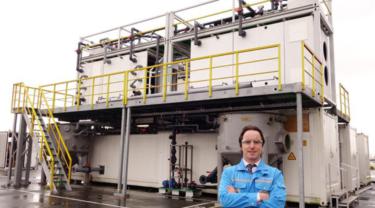
Saltworks Technologies uses innovation in the world's murkiest waters
Over the last decade, engineer Ben Sparrow spent many nights and weekends in his East Vancouver apartment pursuing his “hobby” – exploring ways to generate cheap renewable electricity by mixing water from the sea and fresh sources.
While he didn’t get there, his research led him to something equally valuable to the world: a cheap method for disposing toxic wastewater in an environmentally safe way, while potentially saving industry billions of dollars.
“I was building a machine in my apartment that would generate electricity by mixing river water with ocean water in an estuary,” says Sparrow. “It generated power, but it did so relatively inefficiently, and (instead) I found a way to alter the process and desalt sea water using about 80 per cent less electrical energy than the conventional method.”
Today, Sparrow and company co-founder Joshua Zoshi oversee Saltworks Technologies Inc., a Vancouver-based firm with 55 employees that is now growing eight figure export sales worldwide. Among its shareholders, Saltworks counts some of the world’s oil, gas and mining heavyweights including BP PLC, ConocoPhillips and Canada’s own Cenovus and Teck Resources.
Sparrow says having these shareholders is a “huge benefit to Saltworks.” “Our product lines were co-developed with our industrial shareholders, such that they were ‘industrial-use’ ready,” he said. “They were early customers and noticed how our technologies have a long-term strategic fit with their business.”
Saltworks has also gained from its products being used by these shareholders in both the United States and Australia. “It has reputational value that our products are supported and used overseas and that they were developed with their needs in mind,” says Sparrow.
The processes Sparrow invented and refined—and for which he has filed more than 40 patents—attracted global attention, including that of the influential magazine The Economist. In an October 2009 article, the magazine focused on the most novel aspect of Saltworks’ process – instead of using large amounts of energy or chemicals, it achieves its results by employing the more economical drying effect of the sun’s heat and low-grade thermal energy—as captured through black plastic pipes and pools.
While much of the desalination industry— forecast to spend more than $16.6 billion (US) globally this year—is focused on producing drinkable water, Saltworks has taken a different path. It concentrates on treating troublesome wastewaters, such as those created in oil and gas operations, ammonia, shale fracking water, mine mineral and acid rock run off, and leachate from landfills.
“We presently focus on treating the most challenging industrial waters,” says Sparrow. “They are the most expensive for the end users to deal with.” Concentrating on this specialty area, rather than producing potable water, also provides much higher margins for Saltworks.
“In the past, industry was able to put wastewater down the sewer and let the municipal treatment plant deal with it, or put the wastewater in trucks, drive it away and pump it down a deep well,” Sparrow said. But regulatory enforcement in the U.S., Australia and China—Saltworks’ biggest markets for its technology—means companies must now treat contaminated water on site. The contaminants are then reduced to solids that can be safely disposed of.
Ironically, Saltworks turned to exporting its technology partly because Canada’s regulation of wastewater management is far behind those of other countries, said Sparrow.
“Canada is a smaller market and it’s better to earn American dollars. But as a Canadian who cares about our environment, I hope that one day we can proudly say that Canada is a world leader in protecting our freshwater resources. We are not there yet.”
Five Questions for Saltworks co-founder Ben Sparrow
What was your first export sale?
We sold a plant to NASA for ground testing and for potential future flight on the international space station. It was a plant for recycling all water on-board, aiming ultimately at deep space travel, such as a mission to Mars. First it goes through extensive ground testing, but maybe one day we will see it loaded onto a rocket. However, today that same technology we developed is now being used in the mining and oil industry on earth.
How did that first export opportunity arise?
It was an advertised tender internationally and we responded to the advertisement. We wanted to get into the ring with our biggest competitors, which was highly valuable. Being an ex national level wrestler, it pays to “get in the ring.” Defeats can teach more than wins.
When it comes to exports, what do you know now that you wish you knew then?
(The need to) pay very close attention to tax issues in foreign jurisdictions. Various states in America have different tax laws, including something called a franchise tax based on the size of your company. You need to be aware of that and price that into your bid.
How has the trading world changed since you started in business?
The American market is much more compelling, because of the U.S. dollar–Canadian dollar differential. I think that is a huge advantage—Canadian manufacturers are able to earn U.S. dollars while a portion of their costs are in Canadian dollars. That is certainly benefiting Saltworks. Our margins have become healthier. We equally need to be ready for when our currency improves.
What is the #1 thing new SMEs need to know about export and trade?
Focus in certain geographic areas—don’t spread yourself out too far all over the planet. We’ve chosen to focus on America and Australia, which have stable contract law, healthy markets and are leaders in terms of regulations in taking care of their water. Whatever is going to happen in the rest of the world, in our industry, is going to happen in America and Australia first.













